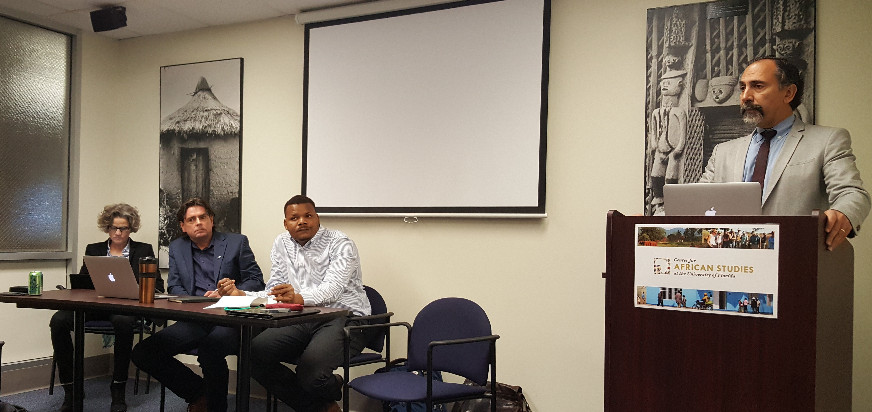On Monday November 14th, Dr. Terje Ostebo (Religion), Ibrahim Yahaya Ibrahim(Political Science), and Dr. Sue O’Brien (History) participated in a roundtable titled, “Countering Violent Extremism (CVE) as a Dilemma for African Muslims”. The roundtable was moderated by Dr. Leonardo Villalon (Dean, Center for International Studies). Dr. Ostebo’s presentation covered CVE from a cross-national point of view, while Ibrahim and Dr. O’Brien discussed on-the-ground CVE practices and obstacles in Niger and Nigeria, respectively.

According to Dr. Ostebo, the term CVE gained traction after it was used at a White House Summit in September 2015. Somewhat replacing the US term ‘war on terror’, now the term refers to a wide variety of global programmatic strategies. While U.S. foreign policy implements CVE plans in expansive programs both domestically and in other countries (often via USAID), European countries use the term CVE to primarily refer to domestic programs. General CVE program spheres include those which address good governance, corruption, economic development, youth programs, etc. Not only are CVE programs vague about how they will specifically counter efforts for violent extremist recruitment, leaders in Africa are now trying to use CVE program mechanisms to strengthen their own power. Very few African leaders come from an Islamic background, and increasingly moves are made to use CVE programs to shrink the political space for any kind of antigovernment political movement.
Ibrahim next discussed USAID approaches to CVE on-the-ground in Niger. He points out that while the general goal of CVE is to de-legitimatize terrorists, CVE in West Africa is just beginning and there is very little understanding of the specific factors which make recruitment into a jihadist movement more likely. Further, while USAID intends to effectively implement programs to combat CVE, there are limits on what can be done with U.S. government money including stipulations that programs cannot promote religion. Ibrahim argues that religious programs would be helpful, as evidenced by Mauritania’s success at using religious activities to de-radicalize its population. The mechanism through which this was achieved was holding publicly televised debates between local Imams and Jihadists which effectively demonstrated holes in jihadist religious ideologies.
Finally, Dr. O’Brien discussed the complexities of the Nigerian context which make CVE programs difficult to implement. The most overwhelming factor which works against combatting violent extremism in Nigeria is the military, which routinely carries out war crimes in targeting Boko Haram and the non-violent Islamic Movement. O’Brien argues that the methods used by the Nigerian military to target both of these groups directly contributes to the jihadist recruitment, though the Islamic Movement remains non-violent despite extreme provocations. The latest provocation includes the detainment of the leader of the Islamic Movement, Ibrahim Yaqoub Zakzaky and his wife, in a raid which resulted in the massacre of hundreds of Shiites and Zakzaky’s followers. Between 2014 and 2015, 6 of Zakzaky’s sons have also been killed. Another aspect which complicates the potential for effective CVE programs in Nigeria is that the torture and execution of jihadist individuals without investigation into their adherence to jihadism. Still, the US military continues to train Nigerian military though a questioning of the US-Saudia Arabia alliance, which impacts US involvements in Nigeria, is coming into question.